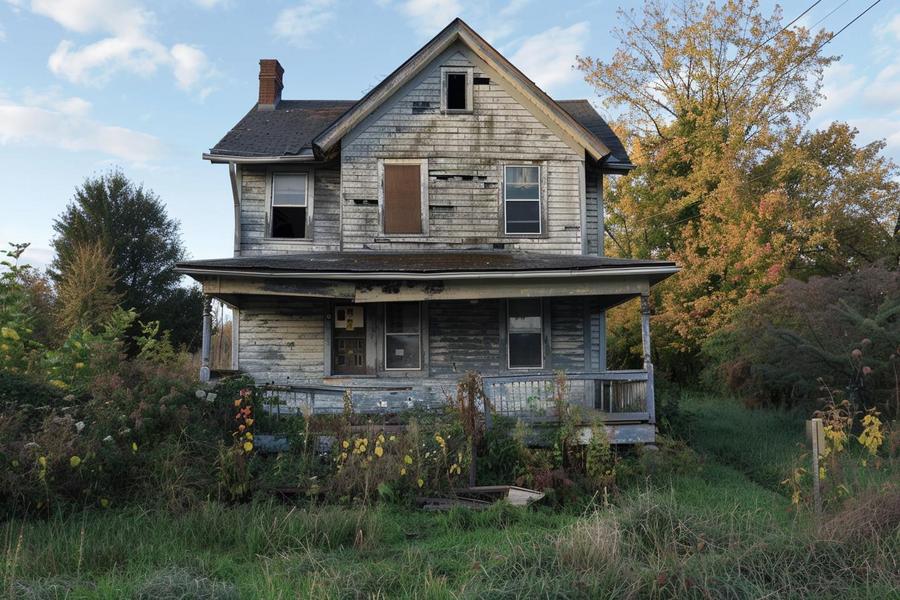Selling a house that's seen better days? You're not alone. Many think a fixer-upper's fate is sealed with low offers or no interest. But here's the truth: Selling a house in poor condition can be simpler than you imagine. This guide dives into what "poor condition" really means, breaks down myths, and explores how to turn your property's fortunes around—fast and as-is. Ready to learn how to sell smart and skip the stress? Let's get started.
TL;DR:
- Selling a house in poor condition appeals to investors and some buyers looking for fixer-uppers; not all repairs increase home value, so choose wisely.
- Minor fixes can boost appeal; for major repairs, assess if they're financially sensible.
- Selling to cash buyers is quick, involves no repairs ("as-is"), and reduces seller stress.
- Pros of selling as-is include no repair costs and a straightforward process, though it might fetch lower offers and require full disclosure of issues.
- Price fixer-uppers by comparing similar sales, factoring in repair costs, and analyzing the market; honesty about the home's condition is crucial.
- Marketing should focus on the home's potential, utilizing photos, virtual tours, and open houses.
- Legal aspects entail disclosing known issues to avoid future legal problems.
- Sellers can choose between selling as-is for a quicker, simpler process or making repairs for potentially higher offers, weighing time and financial considerations.
- During sale negotiations, emphasize the property's positives and be upfront about its condition; cash sales avoid loan approval delays, simplifying closing.

What Does "Selling a House in Poor Condition" Mean?
Defining Poor Condition in Real Estate
A house in poor condition may need many fixes. Buyers may see missing tiles, cracked walls, and broken windows. Buyers know they need to spend money and time fixing these issues. That's what "selling a house in a poor condition" involves.
Common Misconceptions About Selling Homes in Need of Repair
Many people think no one wants to buy a fixer-upper. But, that's not true! Investors and some home-buyers look for these homes. They plan to repair them and either sell or live in them. You don't always have to fix up your house to sell it. "What not to repair when selling a house?" Well, consider not updating kitchens or bathrooms. These repairs can be costly, and you may not get your money back in the sale. Often, selling the house as it is might be your best choice. This approach can save you both time and money.
Is It Worth Making Repairs Before Selling?
Analyzing the Return on Investment for Home Repairs
When you think about fixing your house before selling, ask this first: will the repair pay off? Sometimes, the answer is no. If the cost of repair is high and adds little value, skip it. Focus on repairs only if they increase your home's sale price more than their cost.
Deciding Between Minor and Major Repairs
What about small fixes? Things like broken door knobs or leaky faucets? Fixing these can help make your house more appealing without a big spend. But major things like a new roof? That's costly. See if small fixes can be enough. Talk to a real estate expert to guide you. They can help you find what repairs make sense for your area to get the best return. This ensures you spend wisely, boosting your home’s look and value without breaking the bank.
Related Links:

How Can I Sell My House Fast for Cash?
The Process of Selling to Cash Buyers
Want to sell your house fast for cash? Here's how. First, find trusted cash home buyers. These are often investors looking to buy homes quick. They buy homes "as-is", so you don't have to fix it up first. This means they take your home in its current state.
Next, they will likely ask for a home tour. This can be quick and simple. They check out the house to see what it's like. Don't worry; they aren't looking for perfection.
After they see your home, they'll make an offer. Most times, this offer is fair based on your home's condition. You can get this offer fast, sometimes within days!
Once you accept an offer, the closing can happen really fast. Often, it takes just a week or two. That's much quicker than traditional home selling!
Benefits of Selling Your House for Cash
Selling your house for cash has big perks. For one, it's super fast. You don’t wait around for buyer mortgage approvals. You just get the cash once everything is signed.
You also save on repair costs. Selling "as-is" means you don’t spend extra before selling. This is perfect if you can't afford repairs.
There’s less stress too. You don’t deal with lots of buyers or open houses. It's a simple, direct process with less worry.
Finally, the sale is more likely to close without issues. Cash deals don’t fall through as often as traditional sales. This means less risk of deals failing last minute.
So selling your house for cash can be a great choice. It's quick, easy, and less stressful. Plus, you save on repairs and avoid long waiting times.
What Are the Advantages and Disadvantages of Selling a House As-Is?
Understanding the Pros of Selling As-Is
Selling a house as-is often seems easy. It means you sell your home in its current state. The big pro here? No repair work for you. This is great if you need quick cash or to move soon. Another plus is a straightforward sale process. Buyers know they're getting the home in its exact condition and plan for repairs themselves.
In places with high demand like San Francisco or New York, selling as-is can still fetch a fair price. It attracts flippers or investors looking for a project. This could work to your advantage, as they might pay more than you expect. They look to profit post-fix-up, after all.
Considering the Cons of Selling Without Repairs
However, selling as-is comes with cons. For starters, fewer buyers might feel interested. Most families look for move-in-ready homes. So, targeting the broader market becomes tougher. This can lead to lower offers from the buyers who do show interest.
In smaller markets or less busy areas, like certain suburbs, the impacts hit harder. You could end up getting far less than the market value. Also, remember, as-is does not mean no-disclosure. You must still share any known issues with the house. If not, you risk legal trouble after the sale, which can end up costing you.
So, assess your local real estate climate. Check if houses nearby sell as-is and how they fare. Think about your needs too. Do you prioritize a quick sale or getting a higher price? Your answer shapes your decision on selling your house as-is.

Who Buys Houses in Poor Condition?
Identifying Potential Buyers for Fixer-Upper Homes
Real estate investors often buy fixer-upper homes. They look for properties they can repair and sell for profit. This includes houses that need a lot of work. They do not mind buying a house in bad shape. Investors may pay cash for these homes. This makes the sale quick and simple for you.
The Role of Real Estate Investors in the Market
Investors play a key role in buying homes that are hard to sell. They often target neighborhoods where houses need a lot of care. Cities like Detroit, Cleveland, and Baltimore have many such properties. This helps communities by fixing up run-down homes. It also offers a quick sale option for sellers. Selling a house in poor condition to an investor can be a good choice if you need fast cash.
It is important to know your options when selling a home in poor condition. Understanding who might buy your house helps you make the best decision. Investors give you a way to sell without making costly repairs. This can be a great relief if you're in a tight spot financially or need to sell quickly.
How to Price a House in Poor Condition?
Strategies for Pricing a Home with Defects
When selling a house in poor condition, you need a solid plan. Start by setting the right price. Houses in bad shape sell for less. You are selling the house in poor condition for a lower price due to its flaws.
First, look at similar fixer-upper homes in your area. What did they sell for? This info forms a base for your price. Next, factor in the cost of repairs. Subtract this sum from your base price. This gives you a fair starting point.
Market Analysis for Fixer-Upper Properties
Analyzing the market is key to pricing your fixer-upper right. Study recent sales of similar homes in your community. Focus on homes sold in as-is condition. Understanding trends helps you predict what buyers might pay.
Consider external factors that influence home value. These include location, nearby amenities, and the overall market climate. Using a solid analysis, like the one found when you sell house as is, directs your pricing strategy correctly, making sure it suits both the market and your needs.
By accurately pricing your house, you meet buyer expectations and improve your chances of a speedy sale. This approach gets you the best possible offer, balancing appeal to cash buyers with financial realism.

What Are the Legal Considerations When Selling a Home As-Is?
Disclosing Defects and Issues to Buyers
When selling a house as-is without inspection, always tell buyers about known problems. This honesty prevents legal issues later. Also, it builds trust with potential buyers, boosting your chances of a smooth sale.
Understanding As-Is Sales Agreements
An as-is sale agreement makes it clear you're selling the home in its current state. But, knowing key legal pointers ensures a lawful sale. Learn about your state's specific disclosure requirements. Also, clarify what 'as-is' really means legally. Some buyers might still expect basic utilities to work. Check your local real estate laws to be on the safe side.
For more detailed insights into maintaining your integrity while selling, visit HomeLight's blog on editorial integrity.
Always remember, selling as-is doesn’t mean skipping disclosure. Connection with a knowledgeable local real estate agent might be wise. They can guide you through the specifics of your area’s rules. This step ensures you meet all legal obligations, saving you from possible legal challenges later on.
How to Attract Buyers for a Home in Poor Condition?
Effective Marketing Strategies for Challenging Listings
Attracting buyers for a house in poor condition begins with smart marketing. Photos play a huge role. Show off your home's best features, even if it's not perfect. A fresh coat of paint or a clean yard can make a big difference. Online listings should be clear and honest about the home's condition but highlight potential for buyers.
Open houses work well too. They let buyers see beyond the flaws. At an open house, you can explain how the home's issues can turn into custom projects for new owners. This can turn doubts into excitement for a buyer who loves projects.
Virtual tours help as well. These let buyers check out your place without leaving their home. This is great for pulling in interest from far away. Often, online visitors can appreciate the property's value without stopping at each problem.
Are the strategies enough to sell a house in poor condition? They can be, especially when combined properly. Photos and tours draw in interest. Honest and lively open houses keep it. These tools help buyers see not just what is, but what could be. And that's a powerful selling point.
Can I Sell My House Without Making Any Repairs?
Selling a Home Without Fixing Major Issues
Yes, you can sell your house without making repairs, especially major ones. Many buyers look for homes they can fix and flip. They pay you less but save you from the cost of repairs. This way of selling a home is known as "selling as-is."
Selling as-is means you do not fix any issues in the home before sale. It attracts buyers wanting a project or a deal. Examples include real estate investors or cash buyers. They often look for homes in places like San Jose or Plano where they can increase value.
You just need to inform the buyer about the home's condition. Being honest helps avoid future problems. You must list all major and minor problems with the house. Even small issues like a leak or old wiring.
This is an easy way for sellers facing time restraints or financial issues. Selling as-is can be quick. You do not wait for repairs. Just price the home right, considering its condition. Learn about fair house pricing at sell your house.
Comparison: As-Is Sale vs. After Repair Value Sale
An as-is sale and an after repair value sale differ a lot. In an as-is sale, you sell the home in its current state. This is less money but also less stress and work. You do not spend on upgrades or fixes. The buyer accepts the house as it is.
In an after repair value sale, you first improve the home. This might get you a higher sale price. It might make the home appealing to a wider group of buyers. But, remember, repairs need time and money. You might not get back all you spend on upgrades. It is a risk.
As-is sales often close quicker than typical sales. They have less steps. You do not repair, just sell. But think about your needs and possibilities. What works best for you?
What to Expect During the Selling Process of a House in Poor Condition?
Navigating Buyer Expectations and Negotiations
When you sell a house in bad shape, know what buyers will think. They see the flaws and want a lower price. This is where your skills in talking and making deals come to play. You must be honest about the house's issues but also point out any good parts. For example, maybe it's in a desired area or has a big yard.
Talk to the buyers about their plans for the house. If they want to fix it up, they might not worry much about current problems. But some might want it cheap to tear it down for something new. Keep all talks clear and to the point.
The Closing Process for As-Is Property Sales
Closing an as-is sale can be simple but has steps you must follow. First, both sides agree on a price and sign a contract. This contract says the buyer knows the house's state and takes all risks. Then, generally, they pay with cash, which speeds things up. No banks mean no long waits for loan approvals.
Next, you must handle any legal stuff. This includes making sure there are no claims or leans on the property. It's smart to work with a good real estate agent or lawyer here—they know how to deal with these things.
Lastly, you meet to sign all the final papers. Once done, the buyer gets the keys, and you get the cash. Selling a house in bad condition may seem tough, but with knowledge and the right help, you can do it well and fast.
We covered a lot about selling homes in poor shape. From what it means, to repairs, and selling for cash. We also looked at pros and cons, buyers, pricing, legal stuff, attracting buyers, and the selling process. My final thought? Selling a house like this can work well. You just need the right info and choices.











